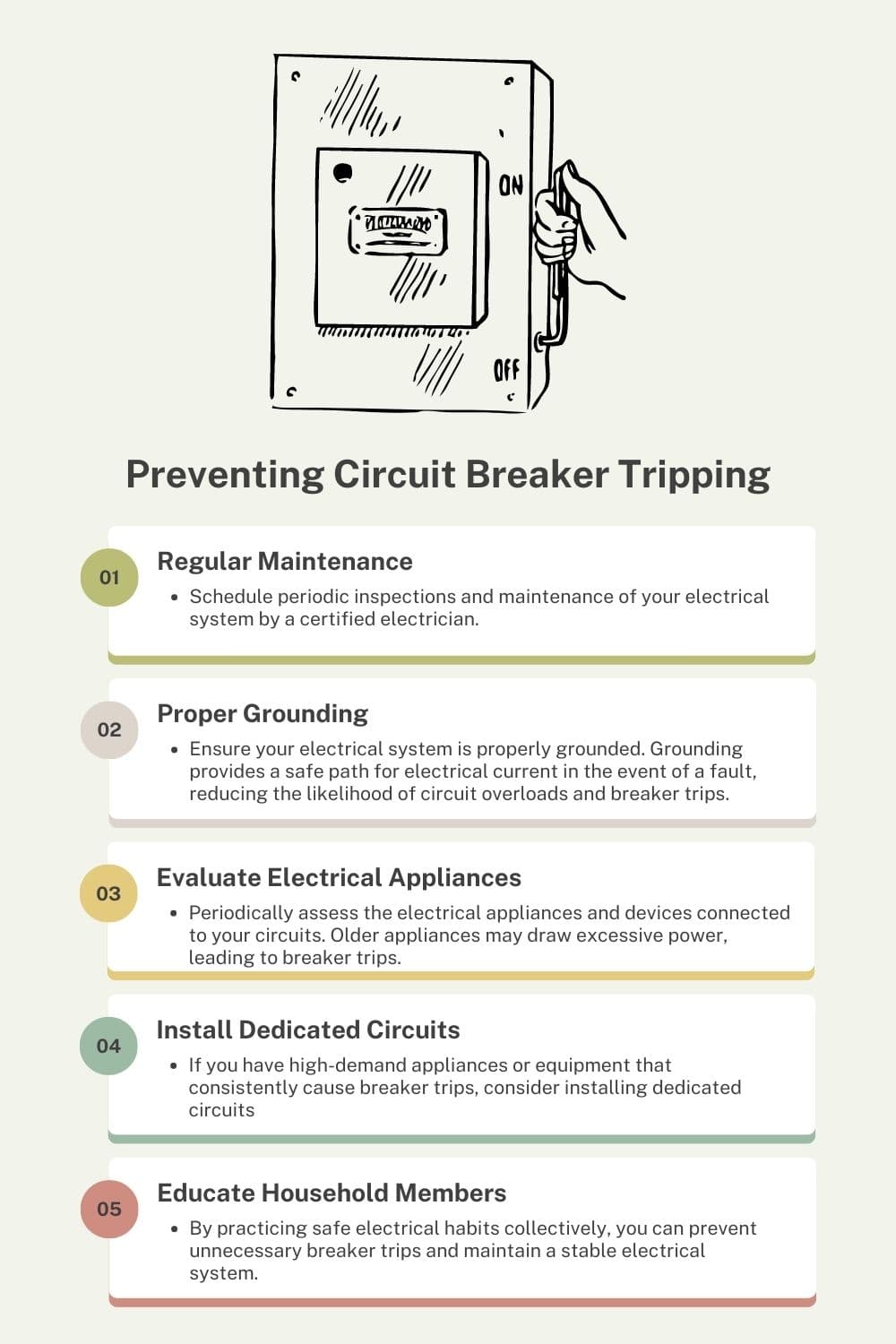Circuit Breaker Keeps Tripping: Causes, Troubleshooting and Solutions

Dealing with a circuit breaker that keeps tripping without any load can be frustrating and worrisome.
If you find yourself constantly resetting the breaker without a resolution, it is crucial to understand the underlying causes and discover effective solutions.
In this comprehensive guide, we will explore common wiring problems that lead to breaker trips and provide expert guidance on how to address them.
By understanding and rectifying these issues, you can ensure a safe and reliable electrical system in your home or building.
Let's dive into the reasons behind circuit breaker trips without load and learn how to resolve them.
Understanding Why Your Circuit Breaker Keeps Tripping Without Load
To effectively address the issue, it is important to understand why your circuit breaker keeps tripping.
Although it may seem like there is no load present, there is always some electrical load in the system. This is because components such as capacitors, diodes, and transistors continuously conduct small amounts of current, even when devices are turned off.
Therefore, the notion of tripping without load is actually inaccurate. The key question is, what is causing the circuit breaker to trip despite minimal or no additional load?
Wiring Problems Leading to Circuit Breaker Tripping:
Several wiring problems can contribute to circuit breaker trips without load. Let's explore the three most common issues and their solutions:
-
Current Leakage:
One potential cause is current leakage, where one or more input wires experience small amounts of current flow. Although this can be frustrating, it is actually a safety precaution to protect against electrical hazards.
To address current leakage, it is crucial to identify the source of the leakage. This may involve inspecting the insulation, wire jackets, and connections for any signs of damage.
Seeking assistance from an electrician can help diagnose and rectify current leakage issues, ensuring a safe electrical system.
-
Damaged Wires:
Damage to the wiring can also result in circuit breaker trips without load.
Insects or other pests may have caused significant damage by chewing on the wires. Even under low loads, such damage can disrupt the electrical flow and trigger the breaker.
Resolving this issue requires a thorough inspection of the wiring system. Identifying any areas with frayed, exposed, or damaged sections and repairing or replacing the affected wires will help restore proper functionality and prevent future trips.
-
Loose Wire in an Outlet:
A loose wire in an outlet is another frustrating wiring problem that can cause frequent breaker trips. This issue is particularly common in outlets equipped with a GFCI Outlet.
A loose wire disrupts the electrical connection and prompts the breaker to trip repeatedly.
Resolving this problem requires replacing the outlet or repairing the wiring connection. It is crucial to seek the expertise of a qualified electrician to ensure the task is performed safely and accurately.
Seeking Professional Assistance
While the provided solutions are applicable to a circuit breaker tripping without load, it is important to seek professional assistance if the problem persists.
A certified electrician can conduct a thorough inspection of your electrical system to identify any underlying issues.
They may recommend load balancing techniques, upgrading the electrical infrastructure, or addressing other potential causes of breaker trips. By relying on their expertise, you can prevent future disruptions and ensure a stable electrical system.
Preventing Circuit Breaker Tripping

Implementing preventive measures can significantly reduce the likelihood of circuit breaker trips without load. Consider the following steps:
-
Regular Maintenance:
Schedule periodic inspections and maintenance of your electrical system by a certified electrician. They can identify potential wiring problems, loose connections, and other issues before they escalate. Regular maintenance helps keep your electrical system in optimal condition, minimizing the risk of breaker trips.
-
Proper Grounding:
Ensure your electrical system is properly grounded. Grounding provides a safe path for electrical current in the event of a fault, reducing the likelihood of circuit overloads and breaker trips. A professional electrician can verify and enhance the grounding system if needed.
-
Evaluate Electrical Appliances:
Periodically assess the electrical appliances and devices connected to your circuits. Older appliances may draw excessive power, leading to breaker trips. Consider upgrading outdated or energy-inefficient appliances with newer, more energy-efficient models. This not only reduces the risk of breaker trips but also lowers energy consumption and utility costs.
-
Install Dedicated Circuits:
If you have high-demand appliances or equipment that consistently cause breaker trips, consider installing dedicated circuits. Dedicated circuits provide exclusive power sources for specific appliances, minimizing the chances of overloading and tripping the breaker. Common examples include refrigerators, air conditioners, and washing machines. Checking your breakers and circuits using a circuit breaker finder can be helpful.
-
Educate Household Members:
Promote awareness and responsible electricity usage among household members. Encourage them to evenly distribute electrical loads, avoid overloading circuits, and promptly report any electrical issues. By practicing safe electrical habits collectively, you can prevent unnecessary breaker trips and maintain a stable electrical system.
Dealing with a circuit breaker that keeps tripping can be frustrating. However, by understanding the underlying causes, such as current leakage, damaged wires, and loose connections, you can take appropriate steps to effectively resolve the issue.
Remember, electrical repairs should always be entrusted to experienced professionals to ensure safety and prevent potential hazards. Once the necessary repairs are completed, you can enjoy a stable electrical system, free from the inconvenience of frequent breaker trips.
Proactive maintenance, periodic inspections, and timely repairs will help ensure the smooth functioning of your circuit breakers, promoting a safe and reliable electrical environment in your home or building.
By addressing wiring problems promptly and following preventive measures, you can minimize the likelihood of circuit breaker trips without load and maintain a well-functioning electrical system.
FAQs
-
How can you fix a breaker that keeps tripping?
To resolve a breaker that keeps tripping, follow these steps:
- Identify the cause: Determine if the breaker is tripping due to an overload, short circuit, or ground fault. This will help you address the specific issue effectively.
- Unplug devices: If overloading is the cause, unplug some devices from the circuit to reduce the electrical load.
- Reset the breaker: After unplugging devices, reset the tripped breaker by flipping it to the "off" position and then back to the "on" position. This should restore power to the circuit.
- Distribute loads evenly: If overloading is a recurring problem, redistribute the electrical loads across multiple circuits or consider installing dedicated circuits for high-demand appliances.
- Consult a professional: If the breaker continues to trip or if you suspect an underlying wiring issue, seek the assistance of a qualified electrician. They can diagnose and resolve the problem safely and effectively.
-
What causes a breaker to trip repeatedly?
A breaker can trip repeatedly due to various reasons, including:
- Overloading: When the electrical load on a circuit exceeds its capacity, the breaker trips to prevent overheating and potential fire hazards.
- Short circuits: A short circuit occurs when the hot wire comes into direct contact with the neutral wire or ground wire. This can result in excessive current flow and cause the breaker to trip.
- Ground faults: Ground faults occur when a hot wire comes into contact with a ground wire or a conductive surface. This can also lead to excessive current flow and trigger the breaker.
- Wiring issues: Damaged or faulty wiring, loose connections, or faulty breakers themselves can cause repeated trips.
Identifying the specific cause is crucial to effectively addressing the issue and preventing future trips.
-
Is a breaker bad if it keeps tripping?
Not necessarily. While a breaker that keeps tripping can indicate an underlying problem, it does not necessarily mean that the breaker itself is faulty. Breakers are designed to trip and interrupt the electrical flow when they detect potential dangers like overloads, short circuits, or ground faults. This is a safety feature intended to protect the electrical system and prevent hazards.
However, if a breaker consistently trips even when the electrical load is within the circuit's capacity, it could indicate a faulty breaker that needs replacement. A qualified electrician can assess the breaker's condition and determine if a replacement is necessary.
Remember, it is important to consult a professional to diagnose and resolve breaker tripping issues, ensuring the safety and proper functioning of your electrical system.




